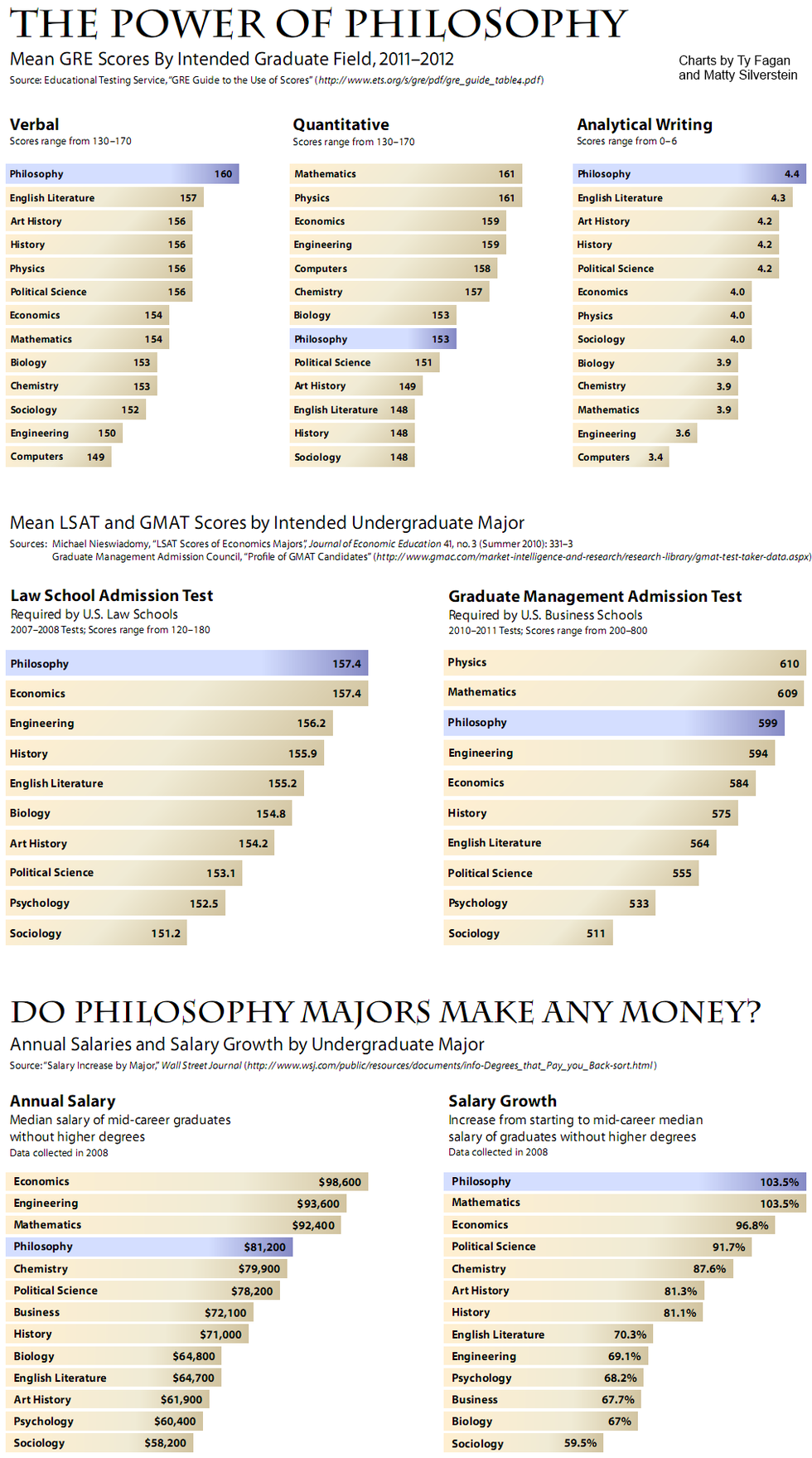It is my understanding that the concept of Philosophy, maybe even since its childhood, has been tormented and torn in different directions by a collection of social strings. These connotative threads have, for the most part, misled society into referring to its uselessness. If you don’t believe me, and you’re in college, tell your parents that you are going to become a philosophy major. I guarantee, for the most part, this will be ill-delivered. I mean, what do you even study as a Philosophy major -- Thinking? I agree with your parents when they say it is an ill investment to spend your tuition learning how to think and trying to compete with others in an already heated job market because you can think.
My hopes are that by the end of this ramble, hopefully, you don’t fall asleep, you’ll understand that Philosophy is more than former societies’ impressions; that it does have a place in society, nay, that it is deserved of priority. If you, by the end of this article, feel you should leave your passion, even of taking care of sick llamas (veterinary school), to make bank or get into your dream graduate school, you have missed my point entirely. I might be a little biased towards philosophy as you’ll soon see, but I will never promote external success, pecuniary, over internal success. Yet, if you are a college student and don’t know what you want to study, have been on the border of majors that might even consist of philosophy, then I hope you are at least closer to enrolling in a philosophy course. This is not solely for college students, for philosophy takes on roles that are vital for numerous things: winning arguments, discerning facts and even bettering your life and finding happiness – it is not just educational.
Where I fit in.
Let’s step back a bit. A little about myself. I am currently a second-semester freshman (or first-year) at Bucknell University, one who is, just like about half of us, on the fence between majors. English, psychology, philosophy, what will it be? I’d be lying if I didn’t tell you I’m pretty committed to philosophy, but, word to the wise, I’ve learned you can’t just go around telling people your major if it is really your likely major – it may change tomorrow. Basically, I have a set of interests, just like every single one of you who is reading this. Now, let’s get to the important matter.
From the days that I can first remember, I was a questioner and a real thinker. Again, everybody reading this is also a thinker and a questioner. The difference is that I couldn’t shut up about it. When I was six I would pester my mom with random questions like, “Mom, why is the sky blue?” So 12 years later and about a billion questions later, I asked, “Professor Ladd, why is the Schwarzchild Radius equation mathematically the equivalent to the radius of the event horizon of a black hole?” – I hadn’t really changed at all. I always prided myself on such acts, like I am the enlightened one for asking the question and being able to regurgitate these answers in completely arbitrary situations. Many people ask these questions, and get the answer, but luckily few have the audacity to appear to be a “know-it-all” and spit out the facts no matter the circumstance. These questions even transgressed over time to the abstract and ridiculous, to questions that have no answer at all. Posing people with inquiries such as what is the meaning of life and dimensionality etc. certainly induced thought, which I love. With all that said, I truly thought I was a philosopher, for having the answers to complex and irrelevant things, and being able to invoke thought in people and myself…
Then I took my first college philosophy course. Throughout that course I was challenged with questions that veiled themselves with complexity to such a degree that they seemed no different than the ridiculous ones that I was prone to asking. However, these questions had right and wrong answers. Something we take for granted today is logic; though it is at the root of all things. We notice the flaws in people’s logic and can display that flaw, but we really are not naturally trained to use logic to formulate a correct answer to things. Being the little philosopher that I have always been, I obviously already knew what my Professor was talking about when he taught us that philosophy derives from philo (loving) and sophia (wisdom). He left the rest of the class to an open forum on the definition of wisdom, in which he disproved people upon their grounds for wisdom’s definition, and added tidbits of what they had to say about it to the meta-definition - this actually went on for two whole classes. At last, we finally had a definition of wisdom that, through use of logic, took into account knowledge and also the experience required to gain it. The point is, there is more than just thinking and spewing out thought required, and albeit I felt belittled when he said I was completely wrong, he never left me with that, he also showed me why.
How is this useful?
I still haven’t answered the question of how this study is useful to the wide variety of people I proposed it was useful to. Philosophy is applicable to society in three different ways. First, it can be used in everyday debate or argument to simply prove that your friend, colleague, archenemy or anyone is simply wrong. That thing I was mentioning earlier, logic, is the key to proving and coming to conclusions. I can’t tell you how many debates I have heard about who is the better player: LeBron or Kobe? And in all of them, each side is so adept at disproving each other, but that is only because nobody ever provides a flawless argument. No one knows how to write out proofs as to what it means to be “the better player,” then provide arguments and counterargument using syllogisms (three-component arguments like A equals B, B equals C and, therefore, A equals C). Philosophy opens a whole new world of argumentation that escapes the raw emotion of a room of people yelling at each other and inevitably taking shots at each other. Furthermore, I strongly feel that to have even the tiniest schooling in philosophy helps to guide the debate to the ultimate answer, the truth, which can be that there is no viable answer.
This brings me to my second point. Philosophy extends its influential hand to subjects that relate to all of society and even humanity. Through use of logic philosophers like Daniel Dennett, “the devil of philosophy,” are able to make seemingly outlandish claims regarding how consciousness works. His work on Multiple Drafts Theory, all done throughpPhilosophy, is paving the way for further progression on the understanding of consciousness (proposed ideas like Integrated Information Theory, etc.). Now I don’t want to turn this into a political debate, but think about it. Philosophy is even necessary, in no way optional, to politicians. Philosophers aren’t potheads asking questions like, “Whoa dude, what if the world were actually flat?” They are individuals trained to ask the appropriate questions and guide their minds to logically proven solutions, to truths. Politics could be reshaped into something less sensational and politic and more logical and rationally concerned.
Believe it or not, Plato makes this exact argument in his The Republic:
 “’Until philosophers are kings, or the kings and rulers of this world have the spirit of philosophy, until political power and wisdom are united, until those commoner natures, who pursue either to the exclusion of the other, stand aside, states will never have rest from their evils – no, nor, I believe, will the human race...’”
“’Until philosophers are kings, or the kings and rulers of this world have the spirit of philosophy, until political power and wisdom are united, until those commoner natures, who pursue either to the exclusion of the other, stand aside, states will never have rest from their evils – no, nor, I believe, will the human race...’”
Philosophy just points to a new set of validity, thinking, and knowledge – wisdom; things that politics could use more of.
The last application of philosophy in society may be the most important. It is as was told to me a few months ago; that the main point of philosophy is to establish what is moral and what has been logically proven through nature so that one can take action using these truths to better their own life and others’. Sometimes this is hard to do, but either way, the end-goal of philosophy is not to think, or even have the answers, it is to take action. Sometimes this action derives from a philosophical truth that you agree with, what will make you happier (maybe mediation or new ways of thinking); but sometimes this action is unwanted and comes from a philosophical premise that makes you uneasy (how unnecessary eating meat is, etc.). Either way, all of society can learn how to live and act better through philosophy by finding connection to a morality that is proven by nature. Socrates stressed this and it has somehow become lost in all of those connotative threads that I mentioned earlier.
You forgot about the students.
Oh no I didn’t. I’ve been saving this for the end because it might be the largest misconception. The fact is, if you become a philosophy major, you are not bound to undergraduate work or to professorship, nor will you end up poor and living off of your successful Political Science major friends like Socrates. In fact, the truth is the opposite. The American Philosophical Association will provide any skeptic, with recent and detailed statistics regarding average wage increase for all majors, and most importantly for philosophy.
Why are philosophy majors at the top of scores and salary statistics? This is a simple question that handfuls of living philosophers can answer and numerous dead philosophers have shown. The fact is that philosophy is not an easy major. In fact, it is one of the most difficult majors. It requires people to do something that they have always, ironically, thought they were good at but weren’t: answer. To think of the most effective argument, to write clearly and precisely what you want, to provide proof that is flawless, are all things that philosophy majors come away with. They also, no surprise, happen to be tasks that graduate tests such as the GRE’s and the LSAT’s focus on heavily. Leaving College as a philosophy major, you are a lethal weapon of argumentation and proof, with a skill that hardly anyone has: writing clearly.
Businesses are looking for what you have. The ability to comprehend information and give logical incite that is valid and succinct. It’s no wonder philosophy majors are finding more job opportunities for creative projects. Philosophy isn’t for everyone, but it certainly isn’t for no one.
Conclusion.
If I haven’t swayed you completely, I hope I have at least challenged you to consider philosophy’s importance. The fact is that it gives a new definition to thought, proof, and even action. Its use can provide society with the rational tools to find the right answers to problems and not the over-emotional and misled ones. Introducing the key feature of philosophy, logic, will help each and every one of you in your small debates with people. Not only will you find the answers to external arguments, but also those internal ones that we are all bound to having. Those tensions within ourselves because our morals or mentality are just not succinct will surely loosen. Though we are all able to be “philosophers,” being a true philosopher does not come immediately and it requires not only thought but also action.






















